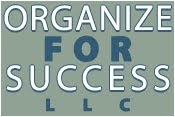If you feel less successful than you'd like, take steps to better address what matters most in upcoming weeks.
Those who have ever played or worked in athletics know there are many preparations that occur before each game, including scouting the opponent, preparing equipment and creating a game plan. Yes, during the game itself, there will be adjustments based off how the other team plays, but coaches would never lead their teams into athletic competitions without creating a game plan beforehand. It is about proactively creating the direction in which you will proceed rather than simply reacting to what's thrown your way, and the same philosophy applies to addressing your priorities for work, home, your community and making yourself the best possible.
Take control of your productivity by creating your own weekly strategy, which is a specific game plan for how you'll address your priorities in each of the following ways:
- Carryover Tasks - Evaluate which of the tasks you'd planned to do during the week that's ending were actually completed; determine what's left undone and when those undone tasks can be rescheduled. Be honest with yourself about what you are actually willing to do. If not you, then who can accomplish what needs to get done? What can you delegate? Does each incomplete task truly need to happen or can any be deleted?
- Team Communications - Get in-depth updates from each member of your team (at work, at home, involved with the community projects you're currently addressing or those with whom you've contracted to get more done), seeking input on what is working, what is not working and what needs attention.
- Client Communications - Catch-up on processing outstanding emails, phone calls and snail mail. Reach out to schedule time with those who have been needing your attention. Touch bases with clients from whom you've not heard lately, whether with gratitude, to wish a happy birthday or simply seeing how things are going. Sometimes, reaching out should include a call to action; however, realize that reaching out without a call to action can provide even greater results in certain scenarios.
- New Tasks - As every project should be broken down into smaller, more manageable action steps with associated deadlines for their timely completion, there is a good chance upcoming deadlines are approaching, and there are tasks related to those deadlines that need addressing in the upcoming week. Decide which new tasks should be added to your to-do list, ensure you are clear on their associated deadlines, and make time for taking action to get them done.
- Time Commitments - Review the next week's appointments to make certain you're prepared for all related tasks, ensuring there is time for necessary preparations and travel to each. Do you need to incorporate any additional buffers for traffic or unforeseen things that'll pop up? Do you know which will occur in person, over the phone or via video conference? Are you clear about how to get to each of the in-person commitments?
- Development - Never neglect a focus on continually improving yourself. Determine opportunities for personal and professional growth; what will move you towards your goals? This could be training, networking or anything focused on fueling your desired results. Review what upcoming options have come to you via email, snail mail, websites you've seen or conversations you've had, and make decisions about which can earn space on your calendar, registering to attend once you've determined you will.
It is less important when you complete this process as compared to whether or not you get it done at all; many like to wrap-up the week with a weekly strategy session on Friday, Saturday or Sunday, but choose which works best for your unique situation.
Be strategic and map out a specific game plan for addressing all that needs your attention. Keep in mind each of the elements for work-life integration: work, home, community or society as well as the private realm of mind, body and spirit. As each of these elements is a layer of life with rotating levels of emphasis, focus on how you can best invest the upcoming week's 168 hours to address the current priorities within each realm of your life.
Especially when you first start implementing the weekly strategy session, set a timer. Knowing you have a certain amount of time in which to complete this checklist will keep you focused and better ensure your planning doesn't run longer than necessary.
Do you take time at the end of each week to properly plan the week ahead and proactively address your priorities? How does this equip you for greater productivity? On the flip side, what issues have you encountered when you haven't been able to plan adequately before starting your week?


No comments:
Post a Comment